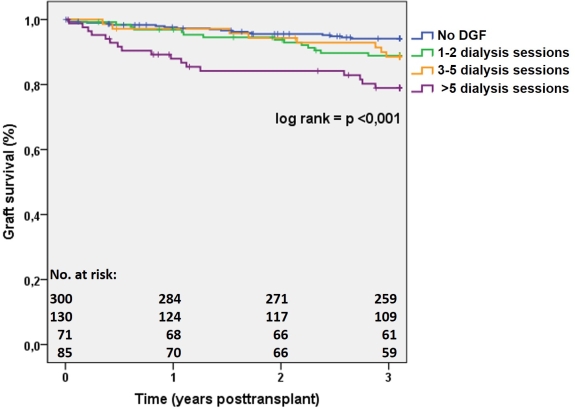Impact of Delayed Graft Function and Number of Dialysis Sessions on Graft Outcome After Kidney Transplantation
Dep.of Nephrology Charité
Campus Mitte, Charité
Universitätsmedizin Berlin, Berlin, Germany.
Meeting: 2015 American Transplant Congress
Abstract number: 440
Keywords: Cadaveric organs, Elderly patients, Graft survival
Session Information
Session Name: Concurrent Session: Kidney - Delayed Graft Function and Older Age
Session Type: Concurrent Session
Date: Tuesday, May 5, 2015
Session Time: 4:00pm-5:30pm
 Presentation Time: 4:00pm-4:12pm
Presentation Time: 4:00pm-4:12pm
Location: Room 115-AB
Introduction
Delayed graft function (DGF), defined as dialysis within the first week after kidney transplantation, is a common and known risk factor for impaired renal graft function. However, the impact of the number of dialysis sessions on graft survival in the long-term is poorly evaluated so far.
Methods
We conducted a retrospective long-term-observational study of a well-characterized cohort including 586 adult patients who received a deceased donor kidney over a period of 10 years. Demographics, clinical data and long-term outcomes over a period of up to 3 years posttransplant were assessed. Mean follow up was 2.73±0.71 years. For further analysis we defined 4 groups who received 0, 1-2, 3-5 and >5 dialysis sessions, respectively. Analyses were performed by Kaplan-Meier survival curves (log-rank test) or Chi square test using SPSS. All results were censored for death.
Results
Among 586 recipients 286 (48.8%) experienced DGF. After 3 years, 13.6% patients with DGF suffered from graft loss compared to 5.7% of patients without DGF (p= 0.001). Within the DGF groups patients with 1-2 (n= 130) and 3-5 dialysis sessions (n=71) showed no statistically significant difference in graft survival compared to patients without DGF. However, patients with >5 dialyses (n=85) showed significantly more graft losses (log rank p< 0.001) (Fig.1). Subanalysis of recipients >65 years (n=180), representing the Eurotransplant Senior Program, showed significance in the group >5 dialysis sessions (p=0.009), whereas in the group of 18-64 year old adults >10 dialysis sessions were necessary to impair graft outcome (p=0.031).
Summary
DGF is a predictor for graft loss in the long-term. Intriguingly, up to 5 posttransplant dialysis sessions do not influence the occurrence of graft loss whereas the need of more than 5 dialyses markedly promotes graft loss. Moreover, younger kidney recipients seem to preserve graft function despite prolonged delayed graft function.

To cite this abstract in AMA style:
Lehner L, Hohberger A, Marschke L, Zhang K, Halleck F, Khadzhynov D, Staeck O, Dürr M, Schmidt D, Liefeldt L, Budde K. Impact of Delayed Graft Function and Number of Dialysis Sessions on Graft Outcome After Kidney Transplantation [abstract]. Am J Transplant. 2015; 15 (suppl 3). https://atcmeetingabstracts.com/abstract/impact-of-delayed-graft-function-and-number-of-dialysis-sessions-on-graft-outcome-after-kidney-transplantation/. Accessed February 17, 2026.« Back to 2015 American Transplant Congress
